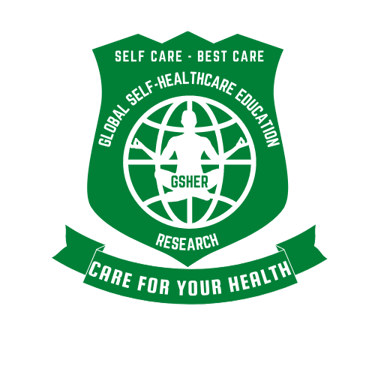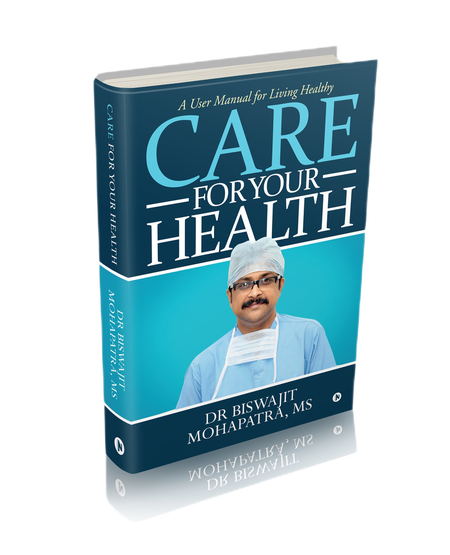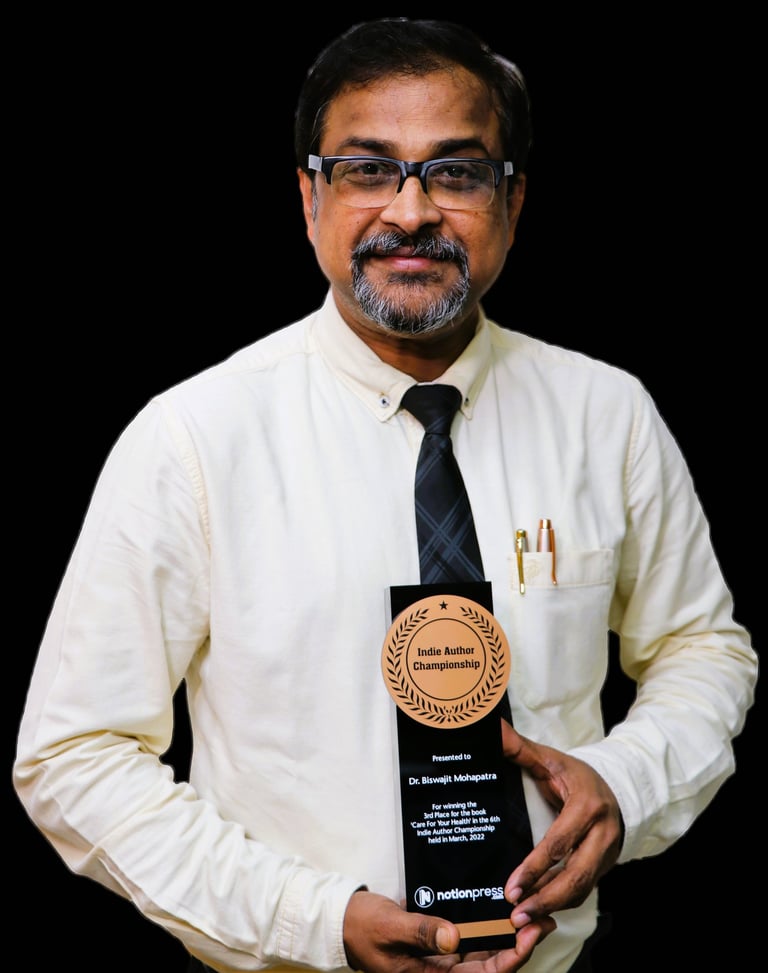Beyond Limitations: Embracing Self-Healthcare as the Best Healthcare
An insightful discussion on how societal norms and personal misconceptions create barriers to proactive self-healthcare and how these can be overcome..
Dr Biswajit Mohapatra
1/9/20256 min read


Beyond Limitations: Embracing Self-Healthcare as the Best Healthcare
Our lives are often guided by the dichotomy of "should" and "shouldn't," creating an invisible web of restrictions around our choices and actions. This self-imposed boundary becomes a limiting factor, turning aspirations into unfulfilled potentials.
In the context of self-healthcare, this dynamic is particularly evident. To unlock the true potential of health and well-being, we must transcend these limitations, reimagining what we can do for ourselves and others.
Self-healthcare is a revolutionary approach to health that prioritizes individual agency, responsibility, and empowerment. It is rooted in the belief that we are the architects of our health, capable of shaping our well-being through informed choices, proactive practices, and a holistic understanding of our bodies and minds.
The notion that self-healthcare is the best healthcare challenges traditional healthcare paradigms, emphasizing prevention, self-awareness, and lifestyle transformation over dependence on external interventions.
The Trap of Limiting Beliefs
Limiting beliefs are the mental constructs that define what we believe is possible or impossible. They often manifest as statements like:
"I can’t control my health; it’s genetic.
"I’m too old to start a fitness routine."
"I don’t have the time to focus on self-care."
These beliefs, often reinforced by societal norms, medical practices, and personal experiences, create barriers to self-healthcare. When people focus on what they should or shouldn't do, they may neglect what they could do. For instance, someone might avoid regular exercise because they believe it requires a gym membership or rigorous training, overlooking simpler, accessible options like walking or yoga.
The impact of limiting beliefs extends beyond individual choices. At a societal level, they contribute to the over-medicalization of health, a reliance on pharmaceuticals, and a lack of focus on preventive care.
Breaking free from these constraints requires a paradigm shift that recognizes the power of individual action and the limitless potential of the human body and mind.
Self-Healthcare: A Path to Empowerment
Self-healthcare is not merely about managing symptoms or adhering to prescribed routines. It is a comprehensive approach that encompasses physical, mental, emotional, and spiritual well-being. It empowers individuals to take control of their health by:
Understanding the Body’s Innate Intelligence: Our bodies are designed to heal and regenerate. Cellular intelligence, for example, allows the body to repair wounds, fight infections, and adapt to changes. We can enhance our health by understanding and supporting these natural processes through nutrition, rest, and mindfulness.
Adopting Preventive Practices: Self-healthcare emphasizes prevention over cure. Regular exercise, balanced nutrition, adequate hydration, and stress management are foundational practices that reduce the risk of chronic diseases and improve overall quality of life.
Cultivating Mindfulness and Awareness: Awareness of one’s body and mind is a cornerstone of self-healthcare. Techniques such as meditation, conscious breathing, and self-reflection help individuals recognize early signs of imbalance and address them proactively.
Fostering Emotional Resilience:
Emotional health is integral to overall well-being. Practices such as journaling, counseling, and therapeutic activities can help individuals process emotions, build resilience, and maintain mental clarity.
Leveraging Community Support:
Self-healthcare is not a solitary journey. Building supportive communities, sharing knowledge, and engaging in collective wellness activities can amplify individual efforts.
Breaking Free from "Should" and "Shouldn't"
To fully embrace self-healthcare, we must move beyond the limiting dichotomy of "should" and "shouldn't." Here’s how:
1. Redefine Goals as Possibilities.
Instead of focusing on rigid goals like "I should lose 10 pounds" or "I shouldn’t eat sweets," reframe these objectives as possibilities. For example, "I could explore ways to enjoy healthier desserts" or "I could find activities that make me feel stronger and more energetic."
This shift from obligation to opportunity encourages experimentation, reduces guilt, and fosters a sense of curiosity.
2. Focus on Small, Sustainable Changes.
One reason people feel limited in their health journey is the overwhelming nature of change. Break down larger goals into manageable steps. Instead of "I should exercise for an hour daily," consider "I could take a 10-minute walk after lunch." Small, consistent actions lead to significant transformations over time.
3. Challenge Assumptions.
Examine the beliefs that underlie your "should" and "shouldn't." Are they based on facts or misconceptions? For instance, the belief that "healthy eating is expensive" can be challenged by exploring affordable, nutritious food options like lentils, oats, and seasonal vegetables.
4. Celebrate Progress, Not Perfection
Health journeys are rarely linear. Instead of striving for perfection, celebrate every small victory. Each step taken toward better health is a testament to your potential and commitment.
5. Embrace Flexibility
Life is dynamic, and so are health needs. Allow room for flexibility and adaptation. Recognize that what works today might need adjustment tomorrow, and that’s okay.
Stories of Transformation
Real-life examples illustrate the power of self-healthcare and the limitless potential of individuals who embrace it:
Ravi’s Journey to Wellness: Ravi Jalan, a 45-year-old office worker, believed he was "too busy" for self-care. After a wake-up call in the form of a health episode, he started incorporating simple habits like drinking more water, taking stretch breaks, and practicing mindfulness. Over a year, Ravi experienced significant improvements in energy levels and mental clarity.
Anita’s Path to Emotional Healing: Anita Lakra struggled with chronic stress and anxiety. Through journaling, therapeutic yoga, and GSHER’S Support, she learned to process her emotions and build resilience. Today, Anita is an advocate for mental health awareness in her local community.
The Elderly Fitness Club: In the small town of Jharkhand, senior citizens formed an Engagement club to combat sedentary lifestyles. By supporting each other and embracing the joy of Body movement, they improved their physical and social well-being, proving that age is no barrier to health.
NPP’s SWASTHY TUNGI is a small initiative towards achieving such outcomes in the elderly population.
The Role of Education and Awareness
Empowering individuals to embrace self-healthcare requires education and awareness. Initiatives like GSHER’s "No Prescription Point" exemplify this approach. By training self-healthcare educators and fostering health literacy, such programs equip people with the knowledge and tools needed to take charge of their well-being.
Education should focus on:
Understanding the Basics of Health: Simplifying complex health concepts to make them accessible.
Promoting Preventive Care: Highlighting the importance of lifestyle choices in preventing chronic diseases.
Encouraging Holistic Practices:
Integrating physical, mental, and spiritual health into a cohesive framework.
Addressing Misconceptions: Dispelling myths and providing evidence-based guidance.
A Vision for the Future
Imagine a world where every individual embraces self-healthcare.
This vision entails
Reduced Healthcare Costs:
By prioritizing prevention and self-management, societies can alleviate the financial burden of healthcare.
Improved Quality of Life: Empowered individuals can lead healthier, happier lives, free from the constraints of chronic illnesses.
Stronger Communities: Healthier individuals contribute to healthier families, workplaces, and communities.
The Role of NPP in Embracing Limitless Self-Healthcare
The "No Prescription Point" (NPP) initiative by GSHER serves as a catalyst in transforming the self-healthcare landscape. It embodies the philosophy of breaking free from traditional, dependency-based healthcare models by empowering individuals to take control of their well-being.
NPP facilitates this shift by:
Health Education:
Providing practical knowledge about preventive care, therapeutic lifestyle changes, and holistic wellness practices.
Building Health Literacy: Equipping individuals with the tools to make informed choices and challenge limiting beliefs about their health.
Community Support:
Creating spaces where individuals can share experiences, learn from each other, and collectively move toward better health outcomes.
Fostering Self-Reliance:
Training self-healthcare educators who guide communities in embracing proactive health practices, reducing reliance on prescriptions and reactive treatments.
Our beliefs about what we "should" or "shouldn’t" do often limit our actions, turning potential into missed opportunities. In the realm of self-healthcare, transcending these limitations opens a world of possibilities. By embracing a mindset of empowerment, curiosity, and resilience, we can redefine health and well-being for ourselves and our communities.
Self-healthcare is not a destination but a journey—one that invites us to explore, learn, and grow without limits. Let’s move beyond the "shoulds" and "shouldn’ts" to embrace what we truly can do: take charge of our health and create a life of vitality and purpose.
Team GSHER




